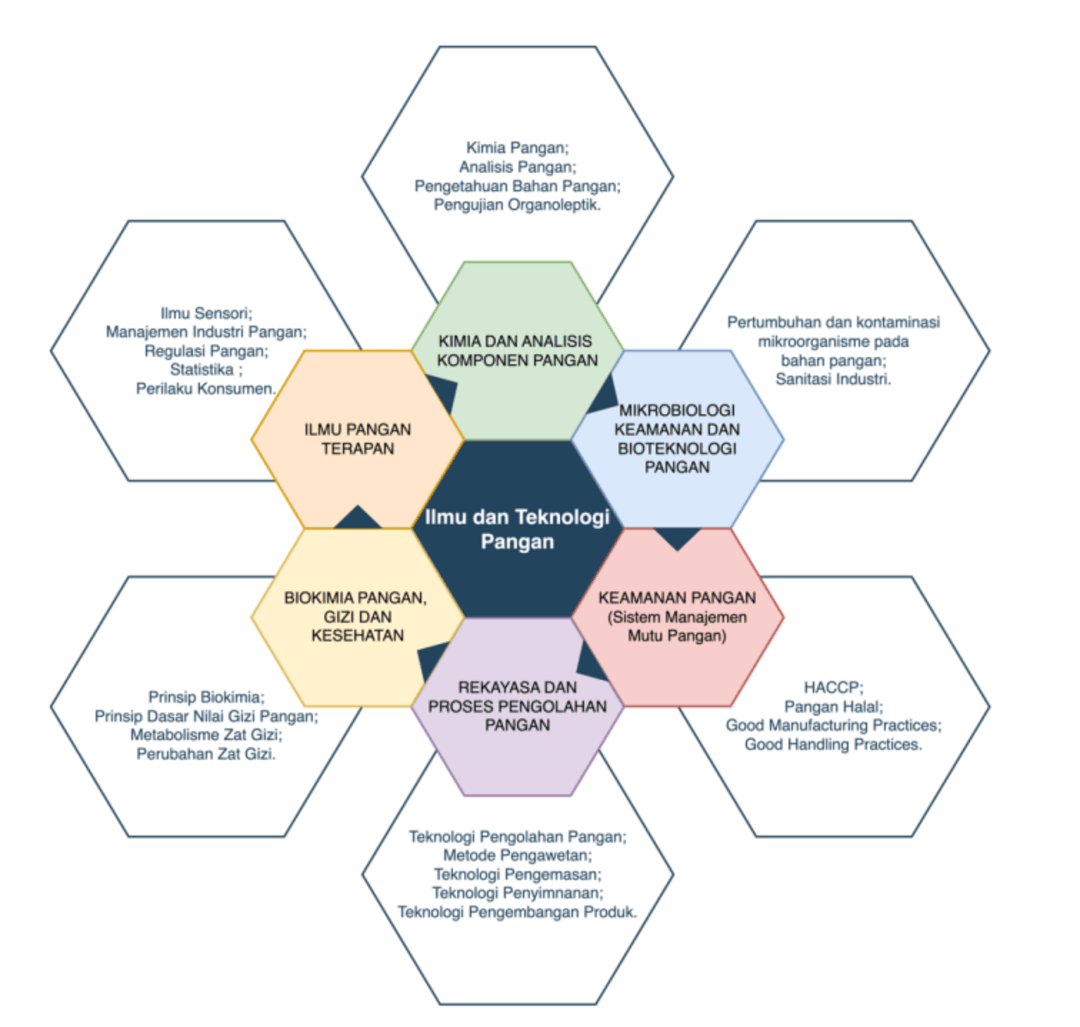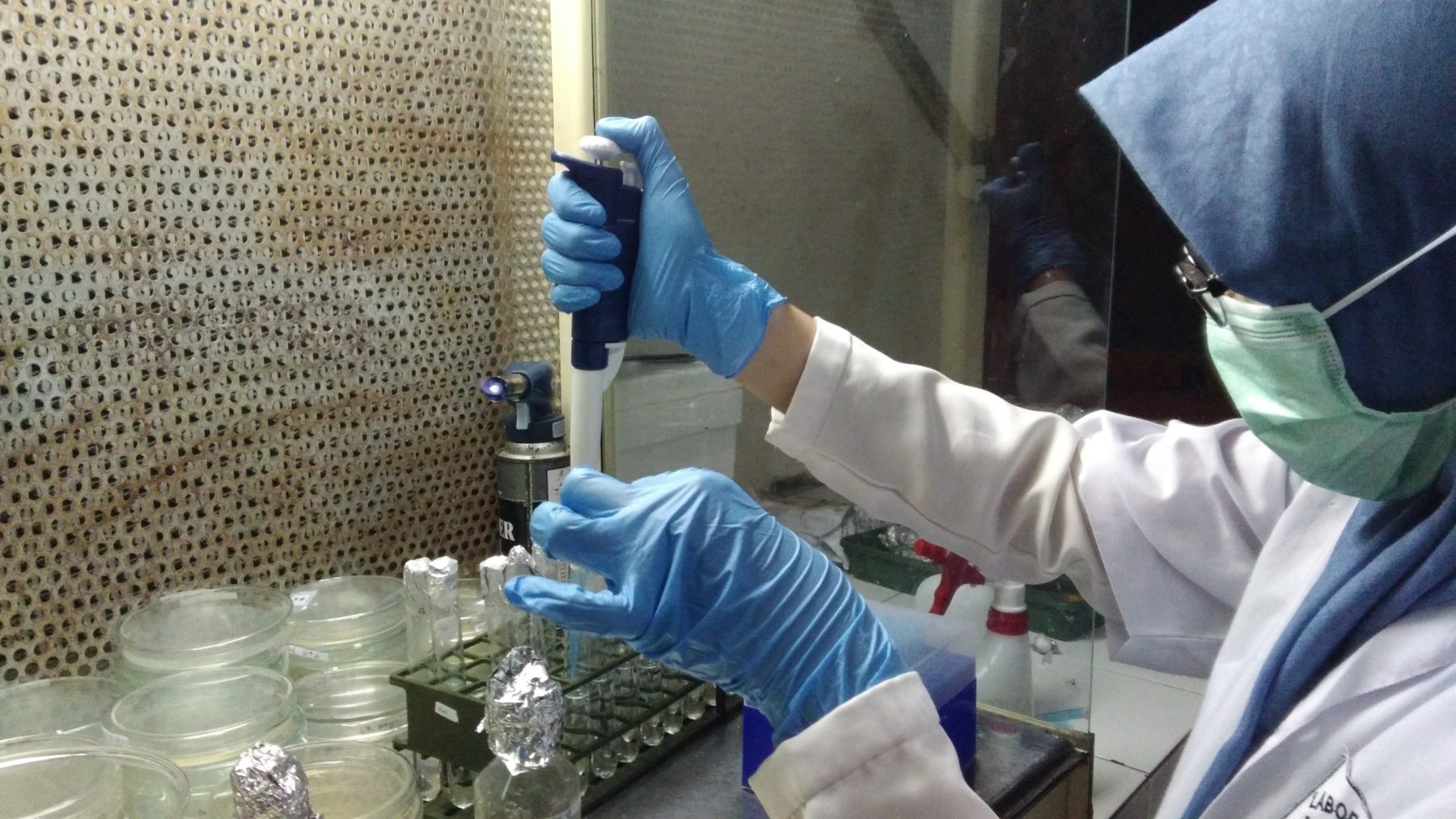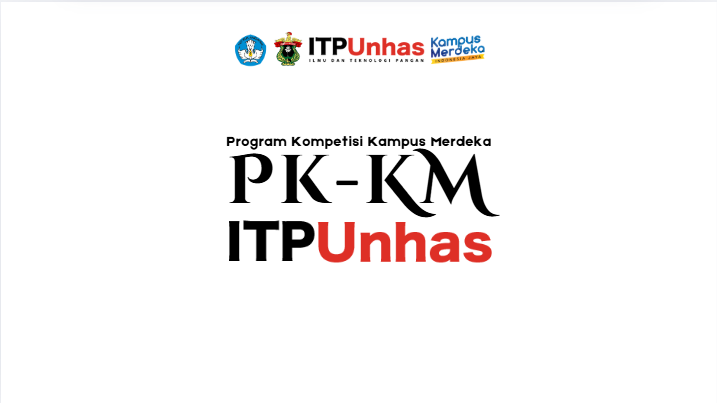Bachelor Programme in Food Science and Technology Curriculum
Evaluation of curriculum implementation at Bachelor Programme in Food Science and Technology Study Program (BP FST) UNHAS is carried out every four years to follow the development of science, applicable regulations, or the needs of the industrial world (DUDI) and stakeholders.
Curriculum updating at Bachelor Programme in Food Science and Technology Study Programme (BP FST) UNHAS is carried out every four years, the 2015 BP FST UNHAS Curriculum was then updated to the 2019 Curriculum. The preparation of the 2019 BP FST UNHAS Curriculum is also based on the Hasanuddin University Academic Senate Regulation on the Hasanuddin University Study Programme Curriculum Development Policy (Number: 46929/UN.4/IT.03/2016).
The 2019 Curriculum Workshop at the study programme level was held in May 2019, then finalized at the Faculty of Agriculture level curriculum workshop in August 2021. Like the previous curriculum workshop activities (Curriculum 2015), this workshop also involved various stakeholders from alumni, industry, government, scientific associations (PATPI), UNHAS Quality Assurance and Education Development Institute (LPMPP), and of course also involved lecturers,
students, and education staff to get input in order to update the curriculum.
In 2020, the Ministry of Education and Culture issued the Policy of “Merdeka Belajar Kampus Merdeka” (MBKM), as an elaboration of the Ministry of Education and Culture Number 3 of 2020 article 15 paragraph (2). In this MBKM policy, students are given the right to study for a maximum of three semesters outside the study programme, namely (1) different study programmes in the same university, (2) the same study programme outside the university, (3) different study programmes outside the university, and (4) various forms of activities outside the university in the MBKM learning channel.
To add input and keep up with the development of science and technology, during the preparation of the curriculum, curriculum searches were carried out at the Institute of Food Technologists (IFT) and the International Union of Food Science and Technology (IUFoST) which are international references for the curriculum of study programmes with food technology science.
The 2019 curriculum is also aligned with the Food Technology undergraduate education standards issued by the Indonesian Food Technologists Association (PATPI). In addition to curriculum alignment in accordance with Indonesian National Qualification Frameworks (KKNI) level 6 components, the 2019 BP FST curriculum also adopts the provisions of Outcome Based Education (OBE) based on the Dean’s Task Letter Number: 2993/UN4.16.1/DL.14.06/2018 concerning the improvement of the OBE-based curriculum.
The curriculum of the Food Science and Technology Study Programme was approved by the senate of the Faculty of Agriculture, Hasanuddin University Curriculum 2023 UNHAS 15 Food Science and Technology Study Programme in accordance with Decree No. 6972/UN4.10/KR.00.01/2019 on the Ratification of the Faculty of Agriculture Curriculum: 6972/UN4.10/KR.00.01/2019 concerning Ratification of the Faculty of Agriculture Curriculum.
Graduate Profile and Competencies
The graduate profile is the field and competency of graduates expected from the designed curriculum.
The profile of BP FST graduates is the expected field of work in accordance with the designed curriculum, namely:
- Industry / agency employees in the food sector. Able to apply the principles of food science and technology related to food processing as employees in the fields of Research and Development (R&D), logistics, production, Quality control, and Quality Assurance.
- MSME Facilitator/Industry Consultant in the Food sector. Have the ability to solve problems in the food industry by applying a comprehensive understanding of the theoretical concepts and principles of food science and technology, as well as in the fields of food product development; food safety and quality; food product systems.
- Academics. Have the ability to disseminate knowledge about food science and technology with good character and attitude.
- Entrepreneur in Food Field. Have the ability to manage food processing businesses and industries from small, medium to industrial scale.
- Researcher in Food Field. Have the ability to analyze and conduct experiments, analysis, data processing, and dissemination of research results in the field of food science and technology.
Based on the Indonesian National Qualifications Framework (KKNI), the competencies of undergraduate graduates must fulfill three (3) aspects of competence, namely (1) aspects of ability in the field of work; (2) aspects of the scope of work based on the knowledge mastered; and (3) aspects of managerial ability.
- Aspects of ability in the field of work. Able to apply the field of food science and technology which includes aspects of food chemistry, microbiology, food process engineering, or food biotechnology in solving problems in the field of food science and technology.
- Aspects of knowledge mastered. Able to master theoretical concepts in the field of food science and technology in general and specifically in depth, and able to formulate procedural problem solving.
- Managerial skills. Able to make the right decisions based on information and data analysis, and able to provide guidance in choosing various alternatives to solve problems in the field of food science and technology.
alignment of the KKNI scope of competence, KKNI level 6 competency descriptions with the competencies of UNHAS ITP S1 graduates
- Specific job skills. Able to design the process of adding value to food ingredients based on the principles of food science and technology by combining various operating units to produce safe, nutritious and quality food products.
- Special knowledge mastered. Mastering knowledge of the principles of food science and technology (chemistry and analysis of food / agricultural products, microbiology and food safety, food processing engineering, food biochemistry and nutrition) to be formulated in integrated process design techniques.
- Managerial skills. Able to communicate orally and in writing about technical and non-technical aspects, think critically and take responsibility for their work independently, work in teams, interact with people from different backgrounds, skilled in organizing and leading in various situations, utilize information sources, and have a commitment to professionalism and ethical values.
Documents
Decree of the Minister of Education and Culture Number 3 of 2021 Document Link
Regulation of Rector of Universitas Hasanuddin Number 2781/UN4.1/KEP/2018 Document Link
Regulation of the Hasanuddin University Academic Senate Number 69124/UN.4/It.03/2016 Document Link
Regulation of the Minister of National Education Number 17 of 2010 Document Link
Regulation of the Minister of Education, Culture, Research and Technology Document Link
Study Materials
The study materials in the BP FST Unhas curriculum refer to the Bachelor's Degree Education Standards in Food Science and Technology according to the KKNI Edition 2 Revised December 2021 which has been prepared by the Indonesian Food Technology Experts Association (PATPI) in Decree No. 03/SK-PATPI/XII/2013 concerning Bachelor's Degree Education Standards in Food Technology.
Body of Knowledge BP FST Unhas

- Explain the chemical structure of food components, their functions, and the main chemical reactions they involve, as well as their relationship with the characteristics of food ingredients and products.
- Apply the principles of food chemistry in controlling chemical reactions that occur in food.
- Explain the main chemical reactions that influence deterioration and limit the shelf life of food ingredients and products.
- Explain the principles of food analysis techniques and methods.
- Skilled in performing basic chemical and applied chemical analysis techniques on food ingredients.
- Choose chemical analysis techniques according to the characteristics of the ingredients and the needs of the analysis objectives.
Food Microbiology
- Identify the types of microorganisms in food that are useful, pathogenic and cause spoilage, as well as their growth conditions
- Explain the influence of environmental conditions (e.g. water activity, pH, temperature and oxygen) on the adaptability, growth and inactivation of microbes.
- Describe appropriate conditions for killing or controlling spoilage and pathogenic microbes in food.
- Apply the principles of food preservation and processing through fermentation process.
- Apply microbiological analysis methods to identify microorganisms in food.
Select appropriate microbiological analysis methods to identify microbes in food.
Food Safety
- Explain the occurrence of food contamination caused by physical, chemical and biological contaminants.
- Describe suitable methods to control physical, chemical and biological hazards in food.
- Describe suitable methods to control physical, chemical and biological hazards in food.
- Evaluate suitable conditions (including sanitation practices) for controlling pathogenic microbes in food production.
- Select sampling techniques appropriate to environmental conditions.
- Develop a plan for a food safety system in a food production process.
- Formulate mass and energy balance in a food production process.
- Explain the sources and diversity of food raw materials and their influence on food processing operations.
- Design a production process on an industrial scale to produce safe and quality food products.
- Use unit operations and food processing equipment to produce a food product on a laboratory or pilot plant scale.
- Explain the effect of preservation and processing methods on the quality of food products.
- Select types of food packaging and packaging methods appropriate to food properties, process and storage conditions.
- Explain the principles and practices of cleaning and sanitizing food processing facilities.
- Explain the principles and methods of water treatment for food processing, as well as handling waste from food processing.
- Explain biochemical processes, basic concepts of nutrition science and the relationship between food consumption and nutritional status.
- Relate the function of food (nutrients and bioactive components) to human health (over- or under-nutrition).
- Explain the biological role of food (nutrients and bioactive components), and the positive and negative effects of consuming food in natural and processed forms on health.
- Explain changes in nutrients during processing and storage.
- Apply basic laboratory techniques in biochemical analysis and biological value of food components.
Sensory Science
- Explain the basic physiology and psychology of sensory testing.
- Apply experimental design and statistical methods to be applied in sensory testing.
- Select appropriate sensory test methods to solve product-related problems.
Food Quality Assurance Management
- Explain the terminology of quality, food quality assurance and control.
- Apply the principles of quality assurance and control in the food industry.
- Apply standards and specifications of certain food products.
- Evaluate the implementation of food quality control systems (e.g. Statistical process control).
Food Regulation and Legislation
- Describe the government regulatory framework required in the production and marketing of food products.
- Describe the process of formulating policies and regulations in the food sector.
- Apply applicable food rules and regulations according to the context.
context. - Analyze a specific case and relate it to the applicable food rules and regulations.
Oral and Written Communication
- Write a technical paper that is appropriate to the context of the problem being studied.
- Demonstrate oral presentation in a scientific forum.
- Prepare visual information materials related to food science for diverse audiences.
Critical Thinking and Problem Solving
- Utilize sources of information and scientific evidence.
- Apply critical and analytical thinking skills for problem solving and decision making.
- Apply food science principles to practical problems and real-life situations.
- Select appropriate analytical techniques when faced with practical/real-life problems.
- Evaluate scientific evidence and process it into information to make conclusions or decisions.
Professionalism and Leadership
- Demonstrate the ability to work independently and in teams, and lead in groups.
- Carry out tasks/projects with good time management to achieve set goals/targets.
- Demonstrate social and cultural skills in a diverse society.
- Describe examples related to professionalism and ethics in the
the field of food science
Course Distribution
To become a Bachelor of Food Science and Technology, each student is required to complete a minimum of 144 credits of courses. We develop a curriculum that is spread over eight (8) semesters, which can be completed in a maximum of 3.5 years.
| No | Code | Course | Credit Point (CP) | ECTS |
| 1 | 23U01110902 | Indonesia Language | 2 | 3,24 |
| 2 | 23U01111002 | The insight of Maritime Social and Culture | 2 | 3,24 |
| 3 | 23U01111102 | English | 2 | 3,24 |
| 4 | 23H01110103 | Basic Mathematics | 3 | 4,86 |
| 5 | 23H03112703 | Basic Chemistry | 3 | 4,86 |
| 6 | 23H04110103 | Basic Biology | 3 | 4,86 |
| 7 | 23H02110703 | Basic Physic | 3 | 4,86 |
| 8 | 23G04110202 | Introduction to Agricultural Technology | 2 | 3,24 |
| No | Code | Course | Credit Point (CP) | ECTS |
| 9 | 23U01110702 | Education of Pancasila | 2 | 3,24 |
| 10 | 23U01110802 | Citizenship Education | 2 | 3,24 |
| 11 | 23U01110…02 | Religion | 2 | 3,24 |
| 12 | 23G03110102 | Calculus | 2 | 3,24 |
| 13 | 23G03110202 | Analytical Chemistry | 2 | 3,24 |
| 14 | 23G03110302 | Organic chemistry | 2 | 3,24 |
| 15 | 23G03110402 | General Microbiology | 2 | 3,24 |
| 16 | 23G03110502 | Food Industrial Management | 2 | 3,24 |
| 17 | 23G03110602 | Applications of Analytical and Organic Chemistry | 2 | 3,24 |
| 18 | 23G03110702 | Application of laboratory technique | 2 | 3,24 |
| No | Code | Course | Credit Point (CP) | ECTS |
| 19 | 23G03120102 | Evaluation of Food Nutrition | 2 | 3,24 |
| 20 | 23G03120202 | Food Chemistry | 2 | 3,24 |
| 21 | 23G03120302 | Research Methodology | 2 | 3,24 |
| 22 | 23G03120402 | Microbiology and Food Safety | 2 | 3,24 |
| 23 | 23G03120502 | Food Quality Supervision and Control | 2 | 3,24 |
| 24 | 23G03120602 | Colloid Physical Chemistry | 2 | 3,24 |
| 25 | 23G03120702 | Food Analysis | 2 | 3,24 |
| 26 | 23G03120802 | Application of Physical and Chemical Changes in Food | 2 | 3,24 |
| 27 | 23G03120902 | Food Biochemistry | 2 | 3,24 |
| 28 | 23G03121002 | Statistic and Experimental Design | 2 | 3,24 |
| 29 | 23G03121102 | Sanitation and Management of Industrial Waste | 2 | 3,24 |
| 30 | 23G03121202 | Application of Food Safety and Microbiology | 2 | 3,24 |
| No | Code | Course | Credit Point (CP) | ECTS |
| 31 | 23G03121302 | Applications of Biochemistry and Postharvest Physiology | 2 | 3,24 |
| 32 | 23G03121402 | Food Processing Engineering | 2 | 3,24 |
| 33 | 23G03121502 | Industrial Microbiology | 2 | 3,24 |
| 34 | 23G03121603 | Food Processing Tools and Machinery | 2 | 3,24 |
| 35 | 23G03131703 | Sensory Analysis | 3 | 4,86 |
| 36 | 23G03131802 | Postharvest physiology and Technology | 2 | 3,24 |
| 37 | 23G03131902 | Food Processing and Preservation Technology | 2 | 3,24 |
| 38 | 23G03122002 | Fermentation Technology | 2 | 3,24 |
| 39 | 23G03122102 | Fishery Product Processing Technology | 2 | 3,24 |
| 40 | 23G03122202 | Meat, Milk, and Egg Processing Technology | 2 | 3,24 |
| 41 | 23G03122303 | Starch and Sugar Processing Technology | 3 | 4,86 |
| No | Code | Course | Credit Point (CP) | ECTS |
| 42 | 23G03130102 | Applications of Animal-Based Products Processing Technology | 2 | 3,24 |
| 43 | 23G03130202 | Fruit and Vegetable Processing Technology | 2 | 3,24 |
| 44 | 23G03130302 | Coconut, Coffee, and Cocoa Processing Technology | 2 | 3,24 |
| 45 | 23G03130402 | Food Biotechnology Application | 2 | 3,24 |
| 46 | 23G03130502 | Legume and Cereal Processing Technology | 2 | 3,24 |
| 47 | 23G03130602 | Food Oil and Fat Processing Technology | 2 | 3,24 |
| 48 | 23G03130702 | Applications of Plant-Based Food Processing Technology | 2 | 3,24 |
| 49 | 23G03130802 | Food Packaging Technology | 2 | 3,24 |
| 50 | 23G03130902 | Entrepreneurship | 2 | 3,24 |
| 51 | Compulsory Courses for Specialization | 6 | 9,72 |
| No | Code | Course | Credit Point (CP) | ECTS |
| 52 | Competency Strengthening Courses | 20 | 32,40 |
| No | Code | Course | Credit Point (CP) | ECTS |
| 53 | Community Service | 4 | 6,48 | |
| 54 | 23G03140101 | Research Proposal Seminar | 1 | 1,62 |
| 55 | 23G03140201 | Research Result Seminar | 1 | 1,62 |
| 56 | 23G03140306 | Thesis/Final Project | 6 | 9,72 |
Curriculum Mapping of Bachelor Programme in FST UNHAS

Documents
Decree of the Minister of Education and Culture Number 3 of 2021 Document Link
Regulation of Rector of Universitas Hasanuddin Number 2781/UN4.1/KEP/2018 Document Link
Regulation of the Hasanuddin University Academic Senate Number 69124/UN.4/It.03/2016 Document Link





